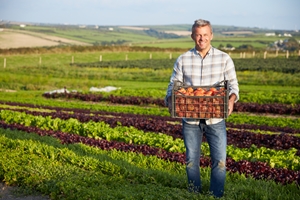
Farming is enjoying a lucrative period of growth, with federal government figures showing the industry generated a record $63 billion in 2016-17. Geelong contributed $422 million to this total, primarily through its well-developed poultry, sheep and lamb production.
But agriculture can be fickle, which is why farmers must actively track their assets, liabilities, costs and risks. Effective farm accounting enables agricultural businesses to maximise profits during boom periods, while preparing for seasonal downturns that can last months or even years.
Your land is a prime asset, so don't let it go to waste.
Here are five of our best tips to improve your current farm accounting methods.
1. Keep up to date with grants and subsidies
Lobby groups, industry organisations, and federal and state governments regularly offer financial support to agricultural businesses. This is particularly true when natural disasters such as droughts and floods ruin crops. If you're not keeping an eye on the latest announcements, you could be missing out on valuable ways to minimise your tax burden and improve your bottom line.
For example, the Victorian Farmers Federation recently unveiled more than $500,000 of funding for projects aimed at farmers who were affected by the March 2018 fires in southwest Victoria. Agricultural businesses will receive up to $10,000 to pay for on-farm infrastructure, fencing and pasture recovery, and business planning services.
2. Get to grips with tax averaging
Tax averaging is an Australian Taxation Office (ATO) concession to primary producers to help them even out severe income fluctuations. Every business has good and bad years, but farmers are particularly vulnerable to seasonal shifts in weather, demand and resource availability.
Through tax averaging, which can be used across a five-year period, you get an offset when your average income is less than your basic taxable income, but you must pay extra tax when your income is more. The ATO also has a Farm Management Deposits scheme whereby you make deposits in prosperous years that you receive back when times are more difficult.
3. Invest in farm accounting solutions
Technology is taking off in a major way in Australian agriculture. The National Broadband Network is reaching a growing number of rural and remote locations, helping farmers revolutionise how they run their businesses.

The best cloud-based software is designed specifically for agricultural operations and can provide a range of features to drive your tax and accounting processes, including:
- Production tracking and monitoring.
- Budgeting and planning.
- Stock valuation calculations.
- Reporting and forecasting.
- Alerts and calendar reminders.
- Collaboration with accountants and bookkeepers.
Many farm accounting platforms also have mobile device compatibility to ensure real-time, seamless updates while on the move.
4. Understand your land values
Your land is a prime asset, so don't let it go to waste and make sure you record any changes in how it's used. Growing crops and keeping livestock are the main uses for agricultural land, but some farmers also rent out unused areas for camping, energy production or other reasons.
Why is this important? The way your land is used could have an impact on its value – and demand for Victorian farmland is currently soaring. Median prices jumped 9.5 per cent in 2017 alone, with Wimmera and Mallee particularly popular, according to Rural Bank statistics. Whether you're buying, selling, leasing or using land for another purpose, there are likely to be GST and other tax implications.
Farmland values continued to rise across most of #Australia in 2017.
Visit https://t.co/E59nwQpRcE to view the full report or read figures for your state, region or municipality.#farmerfocused #futuredriven #agchatoz #property #investment pic.twitter.com/A28PJFcfjR
— Rural Bank (@ruralbank) May 1, 2018
5. Contact experienced farm accounting experts
Farming is an unpredictable and physically demanding industry. Finding the time to keep abreast of the latest developments in tax laws, technology innovations, land values and other agricultural news is never easy. So why not bring in the experts to handle your day-to-day financial needs?
Our seasoned farm accounting specialists in Geelong can help you keep on top of your tax obligations, as well as provide extensive advisory services to support all areas of your business. Contact us today to request an appointment.



